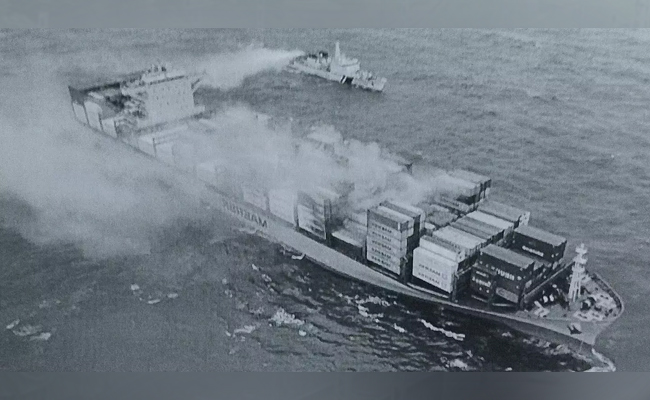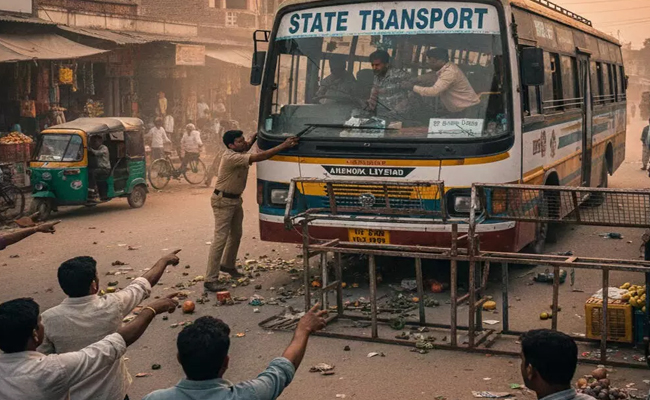Udupi: A massive cargo ship transporting highly flammable oil and solid materials from Mundra port in Gujarat to Colombo, Sri Lanka, caught fire in the Arabian Sea between Goa and Karwar. Currently, the ship is anchored mid-sea near Surathkal, close to Mangaluru's NMPT.
Udupi Deputy Commissioner Dr. K. Vidyakumari and Malpe Coast Guard SP Mithun H.N confirmed that the fire, which broke out on June 19, has been completely extinguished. However, the risk of the fire reigniting, potentially causing the ship to sink and spill oil into the sea, remains. This could result in significant marine pollution affecting the sea coasts of Dakshina Kannada and Udupi districts.
The Indian Coast Guard (ICG) deployed rescue ships and helicopters, successfully extinguishing the fire after 40 hours. There were 21 crew members on board, with one reported missing or deceased. The ICG instructed the district administrations of Karwar and Dakshina Kannada to prepare for any eventuality, including informing coastal residents and readying resources for potential pollution cleanup.
ALSO READ: Landslide, tree fall on Goa-Karnataka border hit traffic on South Western Railway
The ship, MV M. Frankfurt, a Panama-flagged cargo container loaded with International Maritime Dangerous Goods (IMDG) category-4 flammable solids and liquids, is now anchored 33 nautical miles from Surathkal. Officials warn that if the ship sinks or catches fire again, it could lead to severe marine pollution.
District administrations have been instructed to prepare human resources and equipment for emergency situations. An expert team will visit the site to assess the ship's condition and determine the cause of the fire. Further action will be based on their report, and a tug from Sharjah is en route to tow the ship if deemed safe.
Dr. K. Vidyakumari, Udupi Deputy Commissioner, stated, "The district administration received information about the fire on a cargo ship from Gujarat, and instructions were given. We have put the Coast Guard, Fisheries Department, and Environment Department on alert to face any situation."
SP Mithun H.N. added, "The fire on the ship has been completely extinguished. There is no oil leakage at present. Stakeholders will decide on the next course of action based on the expert team's report. We are ready to face any situation."
Let the Truth be known. If you read VB and like VB, please be a VB Supporter and Help us deliver the Truth to one and all.
Mumbai (PTI): Rupee depreciated 9 paise to an all-time low of 90.58 against US dollar in early trade on Monday, weighed down by uncertainty over an India-US trade deal and persistent foreign fund outflows.
Forex traders said rupee is trading with a negative bias as investors are in wait and watch mode and awaiting cues from the India-US trade deal front.
At the interbank foreign exchange market, the rupee opened at 90.53 against the US dollar, then fell further to an all-time intraday low of 90.58 against the greenback, registering a fall of 9 paise over its previous close.
On Friday, the rupee had slipped 17 paise to close at an all-time low of 90.49 against the American currency.
Meanwhile, the dollar index, which gauges the greenback's strength against a basket of six currencies, was trading 0.05 per cent lower at 98.35.
Brent crude, the global oil benchmark, was trading higher by 0.52 per cent at USD 61.44 per barrel in futures trade.
On the domestic equity market front, the 30-share benchmark index Sensex was trading 298.86 points lower at 84,968.80, while the Nifty was down 121.40 points at 25,925.55.
Foreign Institutional Investors sold equities worth Rs 1,114.22 crore on Friday, according to exchange data.
"FPIs continue to be in selling mode in equity and debt while RBI has been selling dollars to fund their long positions," said Anil Kumar Bhansali, Head of Treasury and Executive Director Finrex Treasury Advisors LLP.





